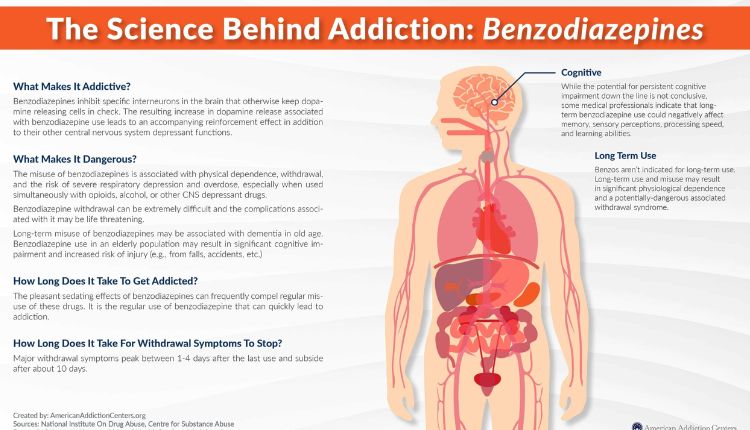Recovery from benzodiazepine dependence isn’t always easy. People may get attached to these medications to help with anxiety or sleep issues. It might also be frightening and overwhelming to stop using these medications. The good news is that moving forward is possible, and the first step in the healing process is mental health reconstruction that involves a safe and structured detox. There is a safe method to detox benzodiazepines using professional treatment, which is the best option as it is a detox with medical oversight and includes long-term help.
Understanding Benzodiazepine Dependence
People get prescribed benzodiazepines to calm down and strengthen sleep patterns. They relax the nervous system, which is beneficial in the short term, but long-term use causes dependency. The body begins adjusting to the medicating presence and eventually cannot function without it. Anxious feelings, insomnia, and restlessness, in addition to other withdrawal symptoms, can start the benzodiazepine dependence cycle. The cycle progresses and starts to negatively affect the dependent’s physical health and mental state, their relationships, and overall quality of life.
Why Detoxing Is the Most Important First Step
Detoxing is the process of removing a substance from the body and managing the body’s withdrawal symptoms. Stopping drug use is not the only thing needed for detoxing. Detoxing unsupervised can be fatal. Attempting to detox unsupervised while addicted to benzodiazepines can lead to seizures, severe anxiety, and depression.
Detoxing under supervision can give you the stability needed for a successful detox. Medical professionals give you a proper assessment, develop a tapering schedule, and prescribe medications to keep withdrawal symptoms under control. This first step is critical for rebuilding the client’s mental health. They can focus their energy on regaining their mental health, long after the drug is removed from their system.
The Mental Health Impact of Benzodiazepines
The toll from substance dependence goes beyond the physical. Benzodiazepine misuse can cause severe anxiety, irritability, depression, destructive thinking, and cognitive impairment, which can feel insurmountable.
Detoxing is the first step and the most important. There is no magic pill that will fix mental health, and it should be the focus of continual treatment. Without the proper treatment, the cycle will continue. That’s why treatment programs must incorporate those missing components on top of the existing mental health programs and focus on building mental health.
Post-Detox Mind Healing
After losing balance, recovery is not instantaneous; rebuilding mental health after detox takes time. Several techniques streamline the shift to a healthier and more grounded life.
Self-help techniques are crucial, including certain forms of Cognitive Behavioral Therapy (CBT), which seeks to calm anxiety and stress management without a substance, and the Mindfulness Movement, which incorporates meditation, breathing exercises, and other techniques to calm the nervous system. Overall, these practices encourage and allow the individual to learn emotional regulation.
Underlying co-occurring disorders must be addressed. People who used benzodiazepines used them as a means to cope with deeper issues, including chronic anxiety, unresolved trauma, and underlying depression. Those conditions must be handled with as much attention as substance use itself.
Recovery Needs Structure
Once detox is completed, the individual is the primary person responsible for forming the framework of their post-detox daily routines. This is crucial in creating a meaningful and stable lifestyle. Predictability significantly reduces the chances that the individual will relapse. High and healthy physical, emotional, mental, and spiritual states that promote resiliency are created and/or enhanced by nourishing meals, meals eaten at predictable times, and regular physical activity. Connection is another important part of recovery. Isolation feeds addiction, but relationships with family and friends and peers in support groups foster accountability and healing. Connecting with others who understand the struggle gives people support, a sense of belonging, and reassures them that they are not alone.
Rebuilding Identity and Purpose
Dependence only leaves someone wondering who they are. Recovery is a chance to rediscover a sense of purpose. Finding new hobbies, going back to school, and refocusing on career goals are all things that will help a person get a sense of worth and motivation. These self-esteem boosters are key to maintaining recovery and a healthy mind.
Spirituality and personal growth are other things that will contribute to recovery. For some, faith adds another support to the framework of recovery. For others, things like journaling, painting, and volunteering will help them find meaning and worth. These all help in reinforcing that a life filled with things other than addiction is valuable and rewarding.
Overcoming the Fear of Relapse
Relapse is the biggest concern in recovery. It’s understandable, but it’s important to state that relapse is not failure. Rather, it is a clear sign that certain areas require more support. Developing effective relapse strategies will help a person identify their triggers, manage their stress, and focus best on their goals. For those who have gone through the process to detox benzodiazepines, relapse prevention becomes even more critical, as it provides the tools to sustain progress and build long-term stability.
Strategies that can help include creating a safe space, avoiding risky situations, and using stress management techniques. Having a plan for relapses is reassuring because it shows that relapses don’t mean that all progress has been lost. Resilience is built around every new effort, and it is what ensures that recovery is ongoing, despite the challenges strewn across the path.
The Role of Family in the Healing Process
Family members see the emotional and mental toll that dependence and withdrawal pose, so they also struggle in silence. Including them in a recovery plan helps strengthen the support network and helps regain the lost trust. Support in family therapy creates understanding among siblings and parents who can help the person in withdrawal cope with the new challenges and communicate positively.
For long-term success, recovery support without enabling harmful behaviors creates an individual with a strong recovery foundation. The journey is healing, becoming shared, creating bonds, and reducing the isolation that addiction creates.
Nutrition and Physical Wellness in Recovery
Dependence and withdrawal are difficult for the body, and it undergoes a lot of stress. Replacing that stress with good nutrition helps with brain recovery. Foods with omega-3 fatty acids and high in antioxidants help with mental clarity and with stabilizing mood.
Exercise also plays a fundamental part. Physical activity lowers stress hormones, increases endorphins, and helps with sleep. Movement strengthens and builds resilience. Whether it is yoga, walking, or weight training, the connection to mental wellness is reinforced.
Long-Term Recovery and Personal Growth
Sustained recovery involves more than just a detox and requires additional milestones to be met. Attending aftercare programs, participating in therapy, and sticking with peer groups offer critical ongoing support. They help with problem-solving during challenging times and help acknowledge success and milestones.
Embracing new points of view and recovering from dependence involves personal growth. Recovery is a unique opportunity to learn about self-discovery, patience, and gratitude. Every moment lived without dependence is a newfound victory, and it helps build the confidence to fully and authentically live life.
Rebuilding Mental Health Is a Lifelong Journey
Even with detox as the starting point, the mental health impact of benzodiazepine dependence requires time to heal. Progress may be evident in the smallest of steps, but each strengthens one’s ability to live substance-free. Recovery is not about perfection—it is about persistence, resilience, and reclaiming a life filled with purpose and stability.
No one has to travel this journey alone thanks to the assistance of professionals, friends, and family. Moving from dependence to independence is possible, and it is a journey worth taking to build a healthier and brighter future.
Final Thoughts
Detoxing from benzodiazepines is the starting point of a journey that is much greater than a physical change. It propels a person to improved mental health, greater self-awareness, and a complete recovery. Individuals learn to effectively manage the problems of daily life without dependence on substance use when they participate in therapy, establish a supportive network, and focus on individual improvement.
Your recovery journey will help you break free from the person you once were and help you build a stronger and healthier version of yourself. Anyone can obtain the recovery they desire, along with the professional treatment programs offered, the support from friends and family, and the other supportive programs available. The end of substance use is only the beginning; the new life one gains is full of strength, mental clarity, and a renewed spirit. Silicon Valley Recovery is a trusted partner, devoted to helping individuals and families find the healing and strength they need.






